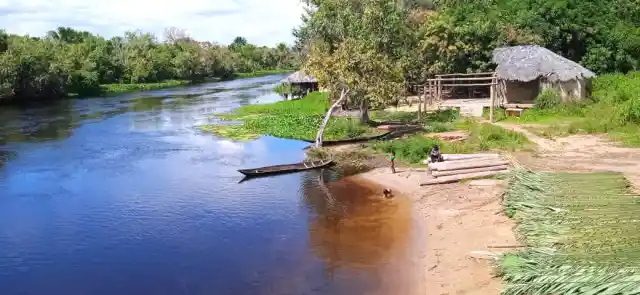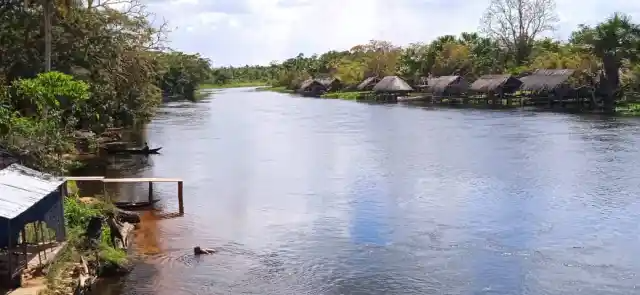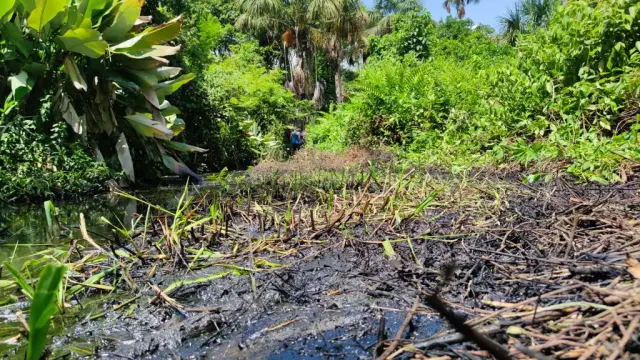
With a dimension of 220,000 hectares, the Guarapiche Forest Reserve, located in the northwest of Monagas State, extends through the municipalities of Maturín and Libertador. There it exists a very wide variety of flora and fauna, being the “morichales” (seasonal floodplain with lagoons) one of the most predominant.
Jefferson Civira // Correspondent lapatilla.com
In recent years this diverse ecosystem has been threatened due to the constant oil spills caused by the lack of maintenance of the oil infrastructure, as well as the indiscriminate felling of trees in this protected area of the region.
The Guarapiche Forest Reserve (RFG) was declared a protected zone on February 15th, 1961, with an area of more than 369,000 hectares and is shared with Sucre State. The objective of this forest reserve was the permanent production of forestry products under technical management plans supervised by the State.
But it is not only about the RFG, but also about the “Gran Morichal Wildlife Reserve”, so decreed on February 20th, 2001 with an area of 130,859 hectares. A varied fauna coexists there, including 133 species of birds, 252 reptiles, 69 fish and 29 amphibians.
This last reserve was named as such with the objective of developing programs for the sustainable management and protection of wildlife and aquatic fauna, ensuring the sustainable use of the species and maintaining the ecological processes that sustain it.
Government indifference

Only in the year 2022, at least seven oil spills were recorded by the Environment Commission of the Legislative Council of Monagas State. The last one was registered three months ago on the Tabasca river under responsibility of Petrodelta in the vicinity of the “El Fangal” settlement, according to information provided by the production engineer, Luis Matey, who also resides in the town of Temblador in the Libertador Municipality.
This hydrocarbon spill lasted between four and five days affecting the stretch between La Sabana sector to the Tabasca river, an accident that the engineer attributed to the lack of maintenance of the pipe network of the state-owned PDVSA.
Matey, who years ago served as head of the Environmental Division in the Ministry of the Environment, recalled that previously there was a headquarters for that ministerial portfolio, but 10 years ago it was dissolved alleging reduction in personnel and budget. In his opinion, the environmental system was left adrift, since there are few or no inspections in environmental matters.
“To this one must add that the former governor and now Minister of Education, Yelitze Santaella, took direct control of the supervision of lagoons as water sources for farms and fishing projects, removing that role from the Ministry of the Environment, since the officials of this ministry were left disabled to sign permits. In the Corralito sector of the Tabasca Parish, Libertador Municipality, many farms have been affected by oil spills, this obviously affects livestock, flora and fauna diversity, all the way to the Uracoa Municipality, further south of the state,” recounted the production engineer.
Furthermore, Matey warned that in the Libertador Municipality there are more than 30 locations affected by oil spills, among which he mentioned Morichal, Aceital, El Salto, and Los Pinos sectors, among others. He affirmed that to date PDVSA has done little to clean up the places affected by these oil spills.
He assures that in this jurisdiction there are no environmental commissions of the Municipal Council or environmental institutions that defend the ecosystem despite the fact that this is an oil producing state. The former official pointed out that the Morichal Largo area is a “protected zone” and the contamination of the river affects families of the Warao indigenous community.
Along with this, the Morichal River is not only contaminated by oil spills, but also by the farms on the banks of this tributary where indigenous families raise animals such as pigs, ducks, capybaras, and the waste and runoff is thrown into the river, as is waste water from the public toilets that are in these areas.
Matey questions that there is no governmental body that regulates this situation, while criticizing the fact that the environment commission of the Socialist Legislative Council of Monagas State does not investigate these irregularities.
Ecosystem alteration
For the Environmental Engineer graduated from the Gran Mariscal de Ayacucho University, Ana Gagliardi, oil spills affect and alter the ecosystems of the “morichales”, as well as the mangroves, since they create a film on the surface of the water bodies that prevents light from penetrating the surface, which in turn makes the photosynthesis process of many primary organisms impossible.
From there on, the rest of the trophic chain of ecosystems is also affected. The environmental specialist warns that the toxicity of crude oil can lead to the death by poisoning of varied fauna and flora.
“For some wildlife organisms, crude oil causes irritation to their mucous membranes, loss of the ability to regulate their body temperature, respiratory and gastrointestinal problems. While the flora is affected in the inhibition of germination and body growth. However, the crops that are close to the spills may be affected due to the reduction in the retention of moisture, nutrients and soil compaction, as well as changes in the pH and salinity of said soils. The cleanup and recovery can take weeks, months and even years, depending on the type of oil spilled, among other factors,” explains the engineer.
Indiscriminate felling

The domestic gas shortage that worsened at the end of 2019 and continued through 2020 and 2021, caused many families to look for options such as cooking with firewood. This resulted in countless trees being cut down for the sale of firewood.
The Morichal Largo forest area has suffered from indiscriminate tree cutting for a long time, worsening even more since the pandemic. To this one must add the low influx of seasonal tourists, since this area was largely dedicated to tourism, says the tourist operator and leader of the Ecological Political Party, Tomasso Pugliese.
Furthermore, he affirms that due to the low influx of tourists in the area, the (indigenous) inhabitants have chosen to dedicate themselves to deforestation. Tens of thousands of hectares are affected, to which one must add a still undetermined disease, which is attacking the morichales (palm tree forests).
In his opinion, he does not understand how an environmental reserve with morichales, which are iconic throughout the state, has been left adrift and what is happening is not investigated. He considers that the environment and tourism directorates of the respective mayors and the regional government should act to promote and increase tourism in the area, and thus prevent deforestation and the sale of wood from being the only source of employment for the indigenous communities.
Mr. Pugliese regrets that the Ministry of the Environment does not have a presence in the “Morichal Largo”, when it is an unique area under environmental protection, not only because of the diversity of flora, but also of fauna, which is being affected by the illegal trafficking of wild animals.
Due to this situation, tourists do not enjoy the wide variety of fauna that existed 20 years ago, which is the time that the Morichal Largo has, along with the tributaries and river banks being deforested, bringing a negative incidence for Monagas State.
In this area of the state, the planting of Caribbean pine is minimal, which is why Pugliese considers that a great reforestation plan is necessary and it would provide forestry development, which would save the natural forests.
He adds that currently more is cut than planted. He calculates that between 350,000 and 400,000 hectares of pine trees need to be planted, but the lack of will prevents this from happening in the medium or long term.
Damage to the ecosystem
When traveling from Maturín to the south of the state, you can see indigenous communities selling wood on the national highway, specifically on the bridge that crosses the Morichal River. Farm owners are the ones who buy it the most, especially for fences for their production units.
When consulting the state director of the Ministry of Ecosocialism, Heberto Solarte, he emphasized that in the indigenous areas, these communities can take advantage of the wood that they cut within their community, but they cannot sell it since this is a crime, although he did not specify which law penalizes this action.
“An indigenous person can, within his territory, cut wood to make their huts, cabins or whatever they are going to do, because otherwise it is a crime,” Solarte asserted.
Furthermore, he pointed out that they are carrying out the “National Reforestation Plan”, in which they have an established the goal to plant 740,000 saplings throughout the entire Monagas territory.
He assured that they are currently in the process of producing the saplings and since peaks of high temperatures are recorded in these months, which are the hottest of the year. He specifies that these activities seek to mitigate climate change.
He assured that they are carrying out a program called “Eco-urbanism” which consists of going to the communities to plant trees. Young people in environmental brigades participate in these activities.
Environmental engineer Ana Gagliardi expresses her concern about the indiscriminate felling of trees, even more so when it occurs in protected areas. She warns that this causes terrible damage to ecosystems as well as a great loss of biodiversity, and prevents the fixation of carbon dioxide (CO2), all of which contributes to climate change.
She points out that this is a rather complicated issue, since the felling is carried out by members of indigenous communities for their economic survival. For this reason, she recommends that this matter be addressed as soon as possible before the logging further affects the Morichal Largo River, as well as the fauna that make up this ecosystem.
The sources consulted for this report agree that the Ministry of Ecosocialism (formerly the Ministry of the Environment) should activate a commission to promptly investigate the oil spills that have been occurring as well as the deforestation that has been occurring for years. If we do not act in a timely manner, the situation could worsen and the negative effects would be felt in the short term with the increase in temperatures and forest fires.

